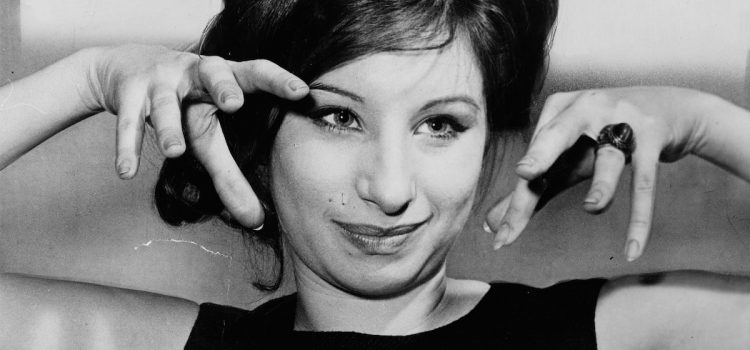
What was Barbra Streisand’s childhood like? What does she value more than anything else? What question did she ask Queen Elizabeth?
We all know Barbra Streisand as a star of theater, movies, television, and music. But, before that, she was a child from a troubled family. In her memoir, she discusses her upbringing and how it affected her. She also shares her top value and how she sees herself—perceptions that are, in part, shaped by that difficult childhood.
Read more to learn about Barbra Streisand’s childhood, self-perception, and what she values most.
Barbra Streisand’s Childhood
According to Barbara Streisand, childhood was an unhappy, even traumatic, period of her life. She was born Barbara (with three A’s) Streisand on April 24, 1942. She emphasizes that “Streisand” is pronounced “stry-sand,” not “stry-zand.” She was born and raised in Brooklyn, New York.
Streisand’s father Emanuel died unexpectedly when she was only 15 months old. She describes her mother Diana as self-absorbed and emotionally distant. For example, instead of empathizing with Streisand’s dream to be an actress and supporting her, Diana often said that she (Streisand) wasn’t pretty enough to be a star and should give up.
(Shortform note: While Streisand doesn’t say that she has Complex Post-Traumatic Stress Disorder (CPTSD), therapist and social worker Pete Walker says that emotional neglect—such as from a distant mother like Streisand’s—is enough to cause a child to develop CPTSD. He adds that the harmful effects of neglect are often overlooked or minimized because people incorrectly assume that it can’t be as damaging to a child’s psyche as physical abuse is.)
Diana couldn’t support the family on her own, so they moved in with her parents. As a result, Barbra lived in a one-bedroom apartment with four other people: her mother, her brother Sheldon, and her maternal grandparents Louis and Esther Rosen.
When Streisand was eight years old, her mother began dating—and eventually married—a man named Louis Kind, allowing them to finally move out of the small apartment. However, Kind mistreated Diana and was emotionally abusive toward the children; Streisand says he seemed to resent her and Sheldon simply for existing.
(Shortform note: What Streisand says here goes directly against some other accounts of Louis Kind, which claim that he was compassionate and loved children. Kind himself told TV Radio Mirror Magazine that he tried to be a good stepfather and that Barbra loved to play games with him, though he admits that their relationship was sometimes strained.)
Streisand says that, because of her difficult childhood, she has always loved escapism. As a child and a teenager, she attended movies and Broadway shows whenever she could; she found fiction more engaging than real life. This undoubtedly contributed to her love of acting and performing.
(Shortform note: Some psychologists say that escapism, such as that which Streisand describes, is a normal and healthy response to the stresses of everyday life. By watching happy stories play out onstage or on a movie screen, you can relax and feel content for a while.)
How Streisand Describes Herself
When talking about herself, Streisand says that, no matter how famous she gets, she still thinks of herself as just a silly Jewish girl from Brooklyn. She says she tends to forget what other people think of her, so she’s often surprised when strangers recognize her or when other celebrities want to meet her.
Relatedly, Streisand credits much of her success to luck, rather than to her efforts. For instance, she says that she just happened to be born with a talent for singing and happened to have met the right people at the right times to help her career take off. She’s also her own harshest critic—she rarely enjoys watching or listening to her performances because she can only see what’s wrong with them.
On the other hand, Streisand says that she’s always been strong-willed and outspoken, even as a child; for instance, she was usually able to get her mother to do what she wanted. As an adult, she tends to speak her mind and isn’t overly concerned with manners. For example, she describes making glib remarks upon meeting many different celebrities and even heads of state, such as asking Queen Elizabeth II why women had to wear gloves to shake her hand but men didn’t.
| Childhood Neglect and Self-Esteem Issues According to some psychologists, what Streisand describes here—her combination of humility and outspokenness—is a common result of childhood neglect. A child who grows up in a neglectful or abusive household is likely to develop self-esteem issues, which fall into two categories: self-underestimation and self-overestimation. Self-underestimation is when a person undervalues their worth. Abused and neglected children often underestimate themselves because their parents teach them that they have little to no value. Sometimes parents do this intentionally by insulting and belittling their children (abuse), but it can also happen from neglect; the child believes their parents are infallible, and therefore concludes that they (the child) must be unworthy of love, rather than recognizing that their parents are the problem. In Streisand’s case, self-underestimation may explain why she often forgets she’s famous and always focuses on what’s not “good enough” about her performances no matter how many other people love them. Self-overestimation is when a person overvalues their worth. Counterintuitively, this can also be the result of childhood neglect. In short, an abused or neglected child often craves attention and validation from others and seeks it by trying to stand out from their peers. This may be what drove Streisand’s interest in performance—because performing makes her the center of attention—but it could also be why she tends to flout social norms. For instance, asking Queen Elizabeth II an unusual question about gloves makes her stand out from the countless other people who meet the queen. |
Streisand’s Key Value: Honesty
Streisand says she hates it when people tell lies. This is because people frequently told her lies while she was growing up and frequently lied about her once she became famous. Furthermore, people tend to believe whatever they read, even when people who know her personally say it’s wrong.
In fact, Streisand’s devotion to the truth is a major part of why she finally agreed to write this autobiography.
(Shortform note: Streisand’s frustration with lying, and how people cling to lies even when they’re told the truth, reflects how quickly misinformation spreads and how hard it is to debunk. Some studies have found that lies reach people up to six times as quickly as the truth. Researchers hypothesize this is because people are more likely to share bizarre and remarkable stories, thereby increasing those stories’ reach; exaggerations and outright lies tend to be more remarkable than the truth.)
Streisand’s drive for authenticity is a running theme throughout her career as well. For instance, she refused to get plastic surgery for her prominent nose, even though numerous people said that doing so would make her more popular (because she’d be more conventionally attractive).
(Shortform note: According to some sources, the issue with Streisand’s nose wasn’t just that it wasn’t conventionally attractive, but that it was a sign of her Jewish heritage. Streisand started her career at a time when “looking Jewish” usually wasn’t acceptable for star performers.)
However, Streisand did make one concession by changing the spelling of her first name: “Barbara” to “Barbra,” dropping the second “a.” The pronunciation is the same, and she says the unusual spelling is eye-catching, which helps her stand out as a performer.
(Shortform note: Using unusual spellings of familiar words or names is a common practice, especially in the internet age—aside from being eye-catching and memorable, unconventional spelling makes companies and products easier to find using search engines. However, some recent research shows that this tactic can backfire: Consumers may see the brand as inauthentic and interpret the unconventional spelling as a deliberate attempt to change how they think about that brand. As a result, while potential customers will certainly remember the company or product, they may choose not to support it.)
Streisand also insisted on staying true to herself during shows. As a young singer performing in nightclubs, she always chose songs that were meaningful to her personally, even if they weren’t quite appropriate for the venue. For instance, she tended to start her acts by singing a ballad, while most performers would open with something uptempo to engage the audience.
(Shortform note: Streisand’s unusual song choices may have helped her attract attention early in her career. As marketer Seth Godin explains in Purple Cow, the most commercially successful ventures are those that stand out by somehow being different from all of their competitors. Furthermore, to stand out, one has to take risks; to make extreme choices that others don’t dare to make. Therefore, Streisand’s ballads—backed by her singing talent and emotional expressiveness—helped her become a hit.)
This is also true of Streisand’s performances in plays and movies. Even though she portrayed fictional characters, she says that she always strove to feel and perform with genuine emotions. Faking feelings has never come easily for her—for instance, she says she can’t cry on command and only does so when a scene moves her to real tears.
(Shortform note: Using genuine emotion to create a convincing performance is commonly called Method Acting or “the Method,” terms coined by acting coach Lee Strasberg. Strasberg believed that a great performance—one that engages and moves the audience—could only come from someone who truly feels the emotions they’re portraying. However, not everyone agrees with the Method. For instance, some actors learn to mimic emotions, rather than genuinely feeling them. Such an actor might portray, say, anger by making a certain face and tensing their muscles so that they move quickly and stiffly.)

———End of Preview———
Like what you just read? Read the rest of the world's best book summary and analysis of Barbra Streisand's "My Name Is Barbra" at Shortform.
Here's what you'll find in our full My Name Is Barbra summary:
- The autobiography of Barbra Streisand, a rare EGOT winner
- Streisand's childhood, romantic relationships, and extensive career
- Why Streisand began singing despite having little to no formal training






